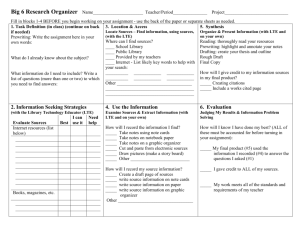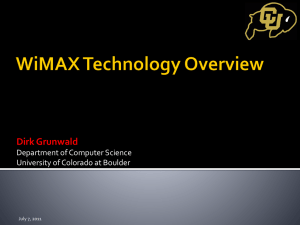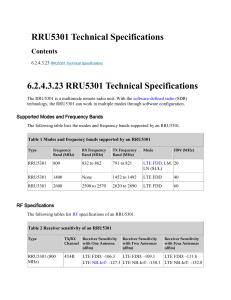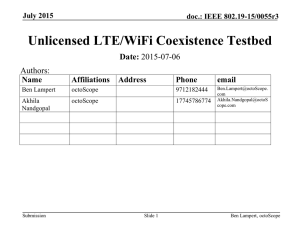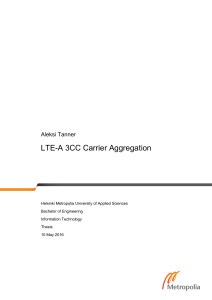LTE(Long TermEvolution) student : 49912119 Yi-Yun Shie
advertisement
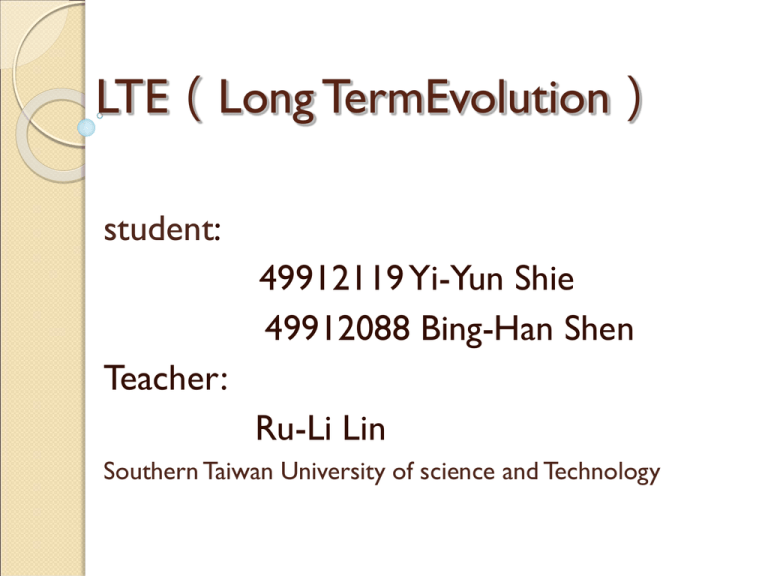
LTE(Long TermEvolution) student: 49912119 Yi-Yun Shie 49912088 Bing-Han Shen Teacher: Ru-Li Lin Southern Taiwan University of science and Technology Directory Mobile Evolution ◦ ◦ ◦ ◦ ◦ 2G 3G LTE Wi-Fi Wimax Motivation to promote LTE Contrast Outlook Reference Mobile Evolution 2G The second generation (Second Generation) mobile communications technology specifications referred to, with respect to the previous generation directly to an analog signal for voice transmission mode, 2G mobile voice communications systems based on digitally transmitted . 3G 3G is the "third generation mobile communication technology" abbreviation is IMT-2000 refers to support high-speed data transmission cellular mobile communications technology. LTE The main requirements for the new access network are high spectral efficiency, high peak data rates, short round trip time as well as flexibility in frequency and bandwidth. Wi-Fi Wi-Fi setup requires at least one Access Point (ap) and one or more client (hi). AP every 100ms the SSID (Service Set Identifier) via beacons (signal station) broadcast packets once beacons packet transmission rate is 1 Mbit / s, and the length is quite short, so little impact on the performance of the network broadcast the action. Because Wi-Fi specified minimum transfer rate is 1 Mbit / s, so make sure all the Wi-Fi client end can receive the SSID broadcast packet, client can decide whether you want to take this one SSID and the AP connection. Users can set where you want to connect an SSID. Wi-Fi system is always connected to the client open standards and supports roaming, which is Wi-Fi benefits. It also means that there is a wireless adapter card may be better than others in performance. Since WiFi signals transmitted through the air, and therefore non-switched Ethernet have the same characteristics. The past two years, the emergence of a new program of WIFI over cable. This program belongs to EOC (ethernet over cable) in one technology. Down through the 2.4G wifi radio frequency transmission cable in the rear. Wimax Worldwide Interoperability for Microwave Access – should be capable of around 40 megabits per second with a range of 30 miles. It is one of the closest technologies to meet the standards of true 4G and as it develop should surpass the 100MB/second which is the 4G standard. Mobile WiMAX allows the use of high speed data transfers and is the main competition for the 4G LTE services provided by cellular carriers. The major wireless networks like Verizon, Sprint, AT&T and T-Mobile are not actually lying to anyone about 4G, they simply stretch the truth a bit. A 4G phone has to comply with the standards but finding the network resources to fulfill the true standard is difficult. You are buying 4G capable devices but the network is not yet capable of delivering true 4G to the device. Your brain knows that 4G is faster than 3G so you pay the price for the extra speed. Motivation to promote LTE Need to ensure the continuity of competitiveness of the 3G system for the future User demand for higher data rates and quality of service Packet Switch optimised system Continued demand for cost reduction (CAPEX and OPEX) Low complexity Avoid unnecessary fragmentation of technologies for paired and unpaired band operation Contrast Downlink peak data rates up to 326 Mbps with 20 MHz bandwidth Uplink peak data rates up to 86.4 Mbps with 20 MHz bandwidth Operation in both TDD and FDD modes Scalable bandwidth up to 20 MHz, covering 1.4 MHz, 3 MHz, 5 MHz, 10 MHz, 15 MHz, and 20 MHz in the study phase Increased spectral efficiency over Release 6 HSPA by two to four times Reduced latency, up to 10 milliseconds (ms) round-trip times between user equipment and the base station, and to less than 100 ms transition times from inactive to active Countries use LTE services LTE networks are being deployed in the country Commitment and the country has built test network Outlook http://youtu.be/nSsh7mgAlv0 Reference http://www.3gpp.org/technologies/keywor ds-acronyms/98-lte http://www.4gamericas.org/index.cfm?fuse action=page&sectionid=249 http://www.samsung.com/tw/support/4glte/ http://youtu.be/nSsh7mgAlv0 http://pcdaily.blogspot.tw/2012/01/news4g2012.html http://download.ithome.com.tw/article/index/id/ 1250 http://www.whatsag.com/ http://blog.xuite.net/chenfy/happydad/16028294%E7%84%A1%E7%B7%9A%E9%80%9A%E8%A8 %8A%E6%8A%80%E8%A1%93%E5%82%B3%E8 %BC%B8%E9%80%9F%E5%BA%A6%E4%B8%80 %E8%A6%BD%E8%A1%A8 http://zh.wikipedia.org/wiki/WiFi#.E7.94.B1.E4.BE.86 Thank you for your listening
